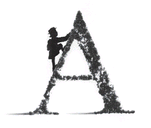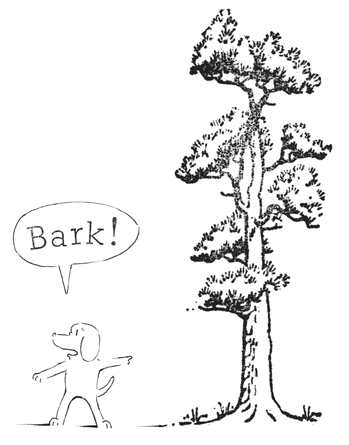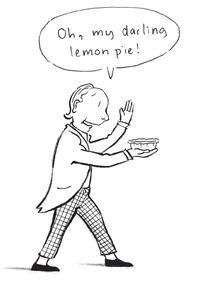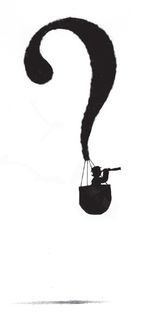The Word Snoop (13 page)
Authors: Ursula Dubosarsky

Answers
PIG LATIN
Today is my birthday. Can you come
to my party?
Hmm. Maybe. I’ll think about it.
Today is my birthday. Can you come
to my party?
Hmm. Maybe. I’ll think about it.
THE REBUS
I wonder if you can guess what a rebus
might be?
I wonder if you can guess what a rebus
might be?
The Word Snoop saw somebody eating
a nice piece of cake.
a nice piece of cake.

Dear Snoops,
Tra-la-la!
Do you like to sing? Words begin as sounds,
just like music and singing. Writing only comes
later. In this part of the book, I’m going to tell
you about some of the weird and lovely things
I’ve discovered in my travels that have to do
with the
sounds
of words.
just like music and singing. Writing only comes
later. In this part of the book, I’m going to tell
you about some of the weird and lovely things
I’ve discovered in my travels that have to do
with the
sounds
of words.
Writers love how words sound, sometimes
even more than what they mean. Plays,
poems, novels
—
so much writing is full of
puns
,
homophones
,
onomatopoeia
, as
well as other playful things like
anagrams
,
acronyms
,
oxymorons
,
tautologies
,
lipograms
,
palindromes
. . .
even more than what they mean. Plays,
poems, novels
—
so much writing is full of
puns
,
homophones
,
onomatopoeia
, as
well as other playful things like
anagrams
,
acronyms
,
oxymorons
,
tautologies
,
lipograms
,
palindromes
. . .
Gosh! Is that the time? I’d better be going.
I’ve got some more snooping to do . . .
I’ve got some more snooping to do . . .
Abyssinia! (I’ll be seeing ya, get it?)
The Whirred
’
sNoop
’
sNoop

7.
Say that again!
PunsKnock knock!
Who’s there?
Lena.
Lena who?
Lean a little closer and I’ll tell you.
Who’s there?
Lena.
Lena who?
Lean a little closer and I’ll tell you.
Do you know what a pun is? If you laughed at this joke, then maybe you do! A pun is a way of using a word (or words) so that it has more than one meaning. So in this joke,
Lena
is a girl’s name, but it also sounds the same as “lean a.” HAHAHAHA! (You can stop laughing now.)
Lena
is a girl’s name, but it also sounds the same as “lean a.” HAHAHAHA! (You can stop laughing now.)
Puns make us laugh because they take our brains by surprise, like seeing a funny picture when you’re not expecting it. Most knock-knock jokes use puns. Nobody knows who invented the knock-knock joke, but they seem to have begun in the 1950s with school children in South Africa. Now there are millions of them out there. Plenty of other types of jokes use puns as well. See if you can spot the double meanings in the ones on the next page.
Shops and businesses often use puns in their
names. A shop that specializes in reading glasses could be called
Special-Eyes,
for example, or a shop that washes your dog could be
The Laundro-Mutt
(like Laundromat—get it?). Have you seen some others?
Q
.
Why did Cinderella get kicked off
the soccer team?
A.
Because she ran away from the ball.
.
Why did Cinderella get kicked off
the soccer team?
A.
Because she ran away from the ball.
Q
.
What’s the difference between your
teacher and a train?
A.
A train says CHOO CHOO and your
teacher says “SPIT OUT THAT GUM!”
.
What’s the difference between your
teacher and a train?
A.
A train says CHOO CHOO and your
teacher says “SPIT OUT THAT GUM!”
Special-Eyes,
for example, or a shop that washes your dog could be
The Laundro-Mutt
(like Laundromat—get it?). Have you seen some others?
Sometimes writers use puns to make you laugh and think at the same time—the Irish playwright Oscar Wilde was an expert at these sorts of witty puns. Even the title of his most famous play is a pun,
The Importance of Being Earnest—
Ernest is a man’s name and
earnest
means “to be honest.”
The Importance of Being Earnest—
Ernest is a man’s name and
earnest
means “to be honest.”
But puns don’t have to be funny. Another Irishman, Samuel Beckett, loved puns so much he even wrote in one of his very serious novels, “In the beginning was the pun.” (So then what happened?) And in the play
Romeo and Juliet
by William Shakespeare, when one of the characters is dying after being stabbed in a fight he says: “Ask for me tomorrow, and you shall find me a
grave
man.” (Because
grave
means “serious” as well as—stop laughing, it’s not funny!)
Romeo and Juliet
by William Shakespeare, when one of the characters is dying after being stabbed in a fight he says: “Ask for me tomorrow, and you shall find me a
grave
man.” (Because
grave
means “serious” as well as—stop laughing, it’s not funny!)

Be warned, puns won’t always make you popular. The most common response to a good pun is a big GROAN . . . As Lewis Carroll, who was rather fond of puns himself, said:
The Good and Great must ever shun
That reckless and abandoned one
Who stoops to perpetrate a pun.
That reckless and abandoned one
Who stoops to perpetrate a pun.
Anyway, don’t worry about that. Everyone knows that children come up with all the best puns. I bet you can think of plenty.
Have a pun time!
HomophonesPuns depend for the most part on something called homophones. A homophone is the name people use when you have two or more words that sound exactly the same but have different meanings, and are sometimes spelled differently too. It comes from (you guessed it!) two ancient Greek words—
homos,
meaning “same,” and
phonos,
meaning “sound.”
homos,
meaning “same,” and
phonos,
meaning “sound.”

All languages have homophones. It’s pretty natural, given all the things and ideas in the world, and how most languages use a limited number of sounds. Chinese is thought to have the most homophones of all, but English has quite a few too. You can find lists of them on the Internet, and in libraries there are whole books of them.
Some homophones in English are thought to have come about because of that rather drastic event I told you of before, The Great Vowel Shift (gulp!), when people started changing the way they said their vowels. So, for example, the words
meet
and
meat
weren’t homophones originally, as they were pronounced differently (the word
meat
used to sound more like “mate”). In the same way, whether something is a homophone or not depends on how you pronounce English. For example, the words
offal
and
awful
are homophones for some English speakers, but not others. (How offally confusing!)
meet
and
meat
weren’t homophones originally, as they were pronounced differently (the word
meat
used to sound more like “mate”). In the same way, whether something is a homophone or not depends on how you pronounce English. For example, the words
offal
and
awful
are homophones for some English speakers, but not others. (How offally confusing!)
Yes, well, homophones can be confusing. That’s why when you’re reading you really have to be grateful for all those silent letters and strange spellings that English is full of. (I knew there had to be something good about all that!) In a book or a story, you’ll never mistake a
knight
for a
night,
or a
symbol
for a
cymbal,
or “I would like a
two, too
” for “I would like a
tutu.
”
knight
for a
night,
or a
symbol
for a
cymbal,
or “I would like a
two, too
” for “I would like a
tutu.
”
Unless it was a particularly strange story . . .
MondegreensOh my darling, oh my darling,
Oh my darling, lemon pie!
You are lost and gone forever
Dreadful sorry, lemon pie.
Oh my darling, lemon pie!
You are lost and gone forever
Dreadful sorry, lemon pie.
Gee, what a sad song! Poor person, to lose their lemon pie. Could someone get me a hankie?
Hang on a minute. What kind of person sings such a sad song about losing their darling lemon pie? Well, nobody, actually. This is just how some people hear the words of the song “Oh My Darling, Clementine.” Sometimes, especially when everyone sings together, the words aren’t very clear, and “Clementine” can sound a bit like
lemon pie
. Say it aloud for yourself a few times, and you’ll see what I mean.
lemon pie
. Say it aloud for yourself a few times, and you’ll see what I mean.
This is something called a mondegreen. It’s what happens when we hear words without reading them and our brains have to work out what we think is being said or, more often, sung
.
The writer Sylvia Wright invented the word in 1954 from something she misheard as a child in a poem her mother used to recite:
which she heard as:
.
The writer Sylvia Wright invented the word in 1954 from something she misheard as a child in a poem her mother used to recite:
“They have slain the Earl of Murray,
And
they laid him on the green
.”
And
they laid him on the green
.”
“They have slain the Earl of Murray,
And
the Lady Mondegreen
.”
And
the Lady Mondegreen
.”
Poor Lady Mondegreen!
Mondegreens happen because of all the homophones and oronyms in English, which are words and groups of words that sound similar but are spelled differently and mean different things. Mondegreens are mistakes, but they’re fun and interesting mistakes. They show us how we listen—first for sounds, then words, then meaning. And they can also reveal things about the mind of the person who does the mishearing . . .

There are lots of mondegreens out there. Do you know the book
Olive the Other Reindeer
by Vivian Walsh and J.otto Seibold? The title comes from a mondegreen in the Christmas carol “Rudolph the Red-Nosed Reindeer,” where “all of the other reindeer” has been misheard by children for years as
Olive, the other reindeer.
Now Olive is famous!
Olive the Other Reindeer
by Vivian Walsh and J.otto Seibold? The title comes from a mondegreen in the Christmas carol “Rudolph the Red-Nosed Reindeer,” where “all of the other reindeer” has been misheard by children for years as
Olive, the other reindeer.
Now Olive is famous!
Probably the funniest mondegreens are from pop songs, like
there’s a bathroom on the right
for “there’s a bad moon on the rise,” or
baking carrot biscuits
for “taking care of business.” Sometimes people don’t realize for years (or ever) that the words could be anything else . . .
there’s a bathroom on the right
for “there’s a bad moon on the rise,” or
baking carrot biscuits
for “taking care of business.” Sometimes people don’t realize for years (or ever) that the words could be anything else . . .
I bet you can think of some words in songs or poems or prayers that you used to sing but found out later weren’t the original lyrics. In the meantime, see if you can work out what the mondegreens on the next page are.
Mondegreens
1.
José, can you sing?
José, can you sing?
2.
Sleep in heavenly peas
Sleep in heavenly peas
3.
The ants are my friends, they’re blowing in the wind
The ants are my friends, they’re blowing in the wind
4.
Knock, knock, knocking on Kevin’s door
Knock, knock, knocking on Kevin’s door

Other books
What Lies Behind by J. T. Ellison
Braking for Bodies by Duffy Brown
A Woman To Blame by Connell, Susan
The Inn at Laurel Creek by Carolyn Ridder Aspenson
The Philadelphia Murder Story by Leslie Ford
Sigma Curse - 04 by Tim Stevens
The Way Of Shadows by Weeks, Brent
The Mad Scientist's Daughter by Cassandra Rose Clarke
Downside Rain: Downside book one by Linda Welch
A Golfer's Life by Arnold Palmer
